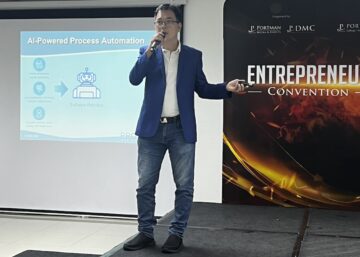
Digital transformation is real and it’s happening right now. Businesses from around the world, in all industries, are committing more time and resources to their ‘Digital Strategy’ than ever before. In Malaysia, the government announced last year a $720 million USD “Industry Digitalization Transformation Fund” that aims to prepare the nation for the digital economy. $50 million USD is allocated to support the transition of enterprises to Industry 4.0. The pressing need for businesses to embrace digitalization put HR leaders under pressure as many companies are shortage of digitally skilled workers.
A lot of companies in Malaysia still fail to grasp the concept of digital strategy. Many still think, if they have a website or an app, then they are digital. Some proudly claimed that their businesses have gone digital as they have been running social media advertisement. Digital transformation is so much more, it means changing how an organization create new values for its customers. These changes affect rethinking strategically on the company’s business model, culture, talent, and process innovation. CEOs need to work with their CTOs / CIOs to figure out their business strategy before they decide what digital tools to use and how to use them. The organizational culture and processes should drive the technology in digital transformation, and not the other way around.
At the recent SME Digital Tech 4.0 Conference 2019 organized by ATCEN, our Principal CTO-for-hire, Mr. Thomas Cheah, was invited to moderate a panel discussion on “Overcoming Challenges in Our Digital Transformation”. The speakers at his panel were Dr. Moonyati Yatid – Senior Analyst at Institute of Strategic and International Studies, Gajendra Balasingham – Group CEO at GKK Consultants, Natalie Sit – CEO at Acestar, and Arividya Arimuthu – Director of Digital Economy and Social Entrepreneurship at Ministry of Entrepreneur Development.
Thomas Cheah: What do you think are the top problems faced by enterprises in Malaysia when it comes to digital transformation? What is standing in their way?
Natalie Sit: I think most of them are afraid of the changes, mostly due to the fear of the unknown in this area. People generally do not like change, especially when it comes to their technology infrastructure. Unless there is a crisis, it is not unusual for employees to question the change, and whether it is necessary at all. The fact is most people cannot sense their business environment changing before it’s too late. In our experience, company culture is often the biggest barrier to digital transformation. Companies that are able to change both their technology infrastructure and their employees mindsets will get the most returns from their digital transformation.
Thomas Cheah: How does Malaysia compare with other countries in the region and globally, in terms of digital transformation?
Dr. Moonyati Yatid: According to Dell Technologies Digital Transformation Index (DT Index) 2018, the majority of organisations in Malaysia (41%) are digital followers, which means there are only a few digital investments and only tentatively starting to plan for the future. Further, only 3% of organisations in Malaysia are digital leaders, which refers to digital transformation in its various forms, is ingrained into their business. Compared to the global average, which is 5% of digital leaders, Malaysia is lacking behind. Within the region, Singapore, Indonesia and Thailand have higher percentage of digital leaders than Malaysia, at 4%, 6% and 7% respectively. The study is aligned with SME Corp survey in 2018, which found that although 80% of SMEs realised the importance of digital adoption, their adoption rate was very low. In fact, it was found that adoption is very low among leading ASEAN manufacturers.
Thomas Cheah: Many employees are resisting digital transformation as they are fear of losing their jobs. How do we address the anxiety among employees especially those who have worked for the organization for a long time?
Arividya Arimuthu: It’s really important for business leaders to communicate to their employees that these technologies will augment their existing jobs. They should explain how their companies are using these new technologies to complement what their employees are currently doing. HR managers should also help their people to master new skills and reinvent themselves. Companies that invest in reskilling employees will often result in increased employee retention. Reskilling an existing workforce is also more cost effective than to hire a new workforce with different skills.
Thomas Cheah: SME business owners often believe that digital transformation is something for large corporates with big budgets. How can SMEs transform in a cost effective manner?
Gajendra Balasingham: It is definitely possible for SMEs to transform as we are currently in the digital age. With the prevalence of cloud computing and readily available low cost software tools, the timing for SMEs to transform couldn’t be better. Most of the big powerful software solution are available on cloud as subscription, which removes the need for big upfront investment. The yearly costs are also kept at the minimum with various practical solution. I strongly recommend SMEs to embrace this digital revolution. Even learning costs are low as many of the key concepts can be picked up from Youtube and other online learning platforms.
Thomas Cheah: Digital transformation is still relatively new to many businesses. Many organizations still do not have the internal expertise to create a digital transformation strategy and manage it to success. What are the fastest ways bridging the gaps?
Natalie Sit: First and foremost, everyone in the company must be fully educated on the journey of digital transformation. The top management should analyze the key areas as well as high impact areas that would be affected. There are no right or wrong during the journey of transformation. Everyone should be allowed to express their creativity and share their thoughts within a certain boundary. Everyone should also be constantly reminded on the end goal that the organization want to achieve.
Thomas Cheah: Digital transformation is still relatively new to many businesses. Many organizations still do not have the internal expertise to create a digital transformation strategy and manage it to success. What are the fastest ways bridging the gaps?
Arividya Arimuthu: I believe in this new digital era, in order to stay relevant, everyone must equip with a continuous learning and growth mindset – regardless of their seniority. We have been working with various government agencies to provide many reskilling and upskilling opportunities to employees at various levels. HR managers in Malaysia must invest in training and reskilling initiatives to ensure their employees are prepared for the challenges ahead. They should also proactively engage their managers about digitalization to future-proof their careers.
Thomas Cheah: Some organizations treat digital transformation as a one-off initiative. What’s wrong with this mind? Why this needs to be changed?
Gajendra Balasingham: Digital transformation must be an on-going initiative. The transformation has three core aspects. People, process and technology. All three evolve over time. While there may be major push at the beginning to kickoff the initiative, subsequently there must be methods to measure progress and interventions to improve as and when the need arises.
Thomas Cheah: Why is digital transformation is so important for all SMEs? Is it equally important for all types of business and industries?
Dr. Moonyati Yatid: It should be a strategic priority for all businesses to embark on a digital transformation journey. In this day and age, customers are getting a very different value proposition to what they did before. A very clear example is the disruption felt by the retail industry; where traditional brick and mortar stores are severely challenged by the likes of Lazada, Zalora, Amazon, Mudah and so on. It is highly possible that this wave will hit industry after industry – if businesses do not start transforming, eventually they will get disrupted. Digital companies are more superior in terms of cost, convenience, speed, and customer service and many more. In short, if a business organisation does not embrace the digital, it will face difficulty to sustain, and even to survive.


